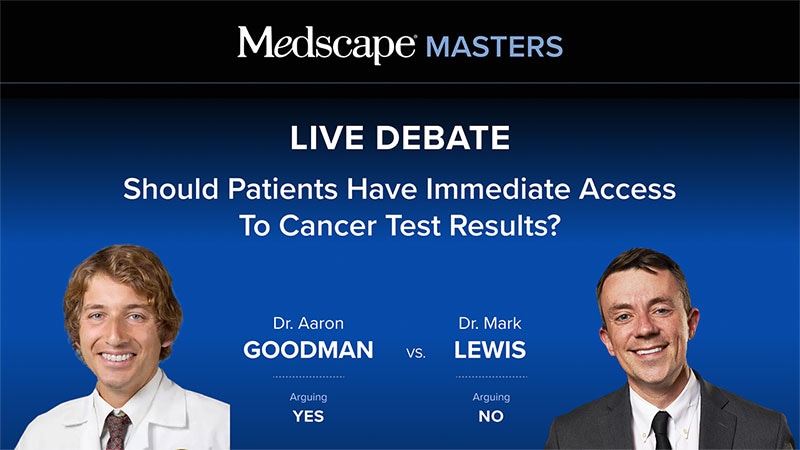Immediate Access to Cancer Test Results Debate: Pros and Cons
Core Concepts
Patients' immediate access to cancer test results sparks debate on benefits and drawbacks.
Abstract
In the Medscape Masters series, Dr. Goodman advocates for patients' immediate access to electronic health records (EHRs) under the 21st Century Cures Act, while Dr. Lewis argues against it, citing burdens on patients and the healthcare system. Both discuss the role of AI in enhancing health literacy and medical report summaries.
Summary:
- Dr. Goodman supports patients' right to view EHRs promptly.
- Dr. Lewis opposes immediate EHR access, deeming it burdensome.
- AI can aid in translating complex medical information for patients.
Key Highlights:
- Dr. Goodman advocates for patient control over health information.
- Dr. Lewis warns of the challenges of understanding test results without medical guidance.
- Both doctors acknowledge the potential of AI in improving health literacy.
Customize Summary
Rewrite with AI
Generate Citations
Translate Source
To Another Language
Generate MindMap
from source content
Visit Source
www.medscape.com
Should Patients Get Immediate Access to Cancer Test Results?
Stats
Patients deserve to see their EHRs without delay.
The 21st Century Cures Act allows patients immediate access to their results.
Quotes
"Patients deserve to see their EHRs without delay." - Dr. Goodman
"Giving all this information to patients puts the onus of understanding their labs unfairly on them." - Dr. Lewis
Key Insights Distilled From
by Resource Cen... at www.medscape.com 10-20-2023
https://www.medscape.com/viewarticle/997464
Deeper Inquiries
How can AI be effectively integrated into patient care to enhance health literacy?
AI can be effectively integrated into patient care to enhance health literacy by utilizing technologies like OpenAI and ChatGPT to synthesize complex medical information into easily understandable language for patients. These AI tools can provide plain-language summaries of medical reports, translating technical jargon into more accessible terms. By delivering information in a compassionate and understandable manner, AI can help patients better comprehend their health conditions, test results, and treatment options. Additionally, AI can assist in enhancing patients' health literacy by providing educational resources, personalized recommendations, and answering common health-related questions. Physician oversight is crucial to ensure the accuracy and relevance of the information provided by AI tools.
What are the potential drawbacks of immediate patient access to test results?
Immediate patient access to test results can have potential drawbacks, such as overwhelming patients with complex medical information before they have the opportunity to discuss it with a healthcare provider. This "à la carte oncology" approach, where patients receive detailed test results without proper context or guidance, may lead to confusion, anxiety, and unnecessary stress. Patients may misinterpret the results, self-diagnose inaccurately, or make decisions based on incomplete understanding. Moreover, immediate access to test results could strain the doctor-patient relationship if patients feel pressured to interpret the information on their own or question the expertise of healthcare providers. Ensuring that patients have the necessary support, education, and guidance when accessing their test results is essential to mitigate these potential drawbacks.
How can patient empowerment through EHR access impact the doctor-patient relationship?
Patient empowerment through EHR access can positively impact the doctor-patient relationship by fostering transparency, collaboration, and shared decision-making. When patients have immediate access to their electronic health records (EHRs), they become more engaged in their healthcare journey, leading to better communication with healthcare providers. Patients who are empowered through EHR access are more likely to ask informed questions, participate in treatment decisions, and take an active role in managing their health. This increased involvement can strengthen the trust between patients and healthcare providers, as it demonstrates a mutual respect for each other's expertise and perspectives. By promoting patient empowerment through EHR access, the doctor-patient relationship can evolve into a partnership based on shared information, shared goals, and shared responsibilities in achieving optimal health outcomes.
0
